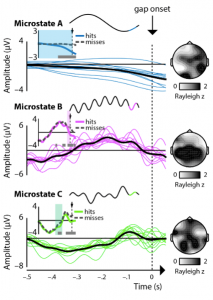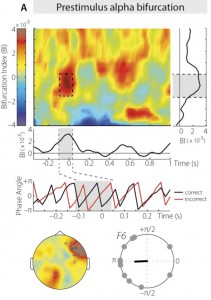Can you attentively “highlight” auditory traces in memory? If so, what are potential neural mechanisms of it?
Sung-Joo Lim’s paper in J Neurosci;
Selective Attention to Auditory Memory Neurally Enhances Perceptual Precision
is now available online (full text).
Abstract
Selective attention to a task-relevant stimulus facilitates encoding of that stimulus into a working memory representation. It is less clear whether selective attention also improves the precision of a stimulus already represented in memory. Here, we investigate the behavioral and neural dynamics of selective attention to representations in auditory working memory (i.e., auditory objects) using psychophysical modeling and model-based analysis of electroencephalographic signals. Human listeners performed a syllable pitch discrimination task where two syllables served as to-be-encoded auditory objects. Valid (vs neutral) retroactive cues were presented during retention to allow listeners to selectively attend to the to-be-probed auditory object in memory. Behaviorally, listeners represented auditory objects in memory more precisely (expressed by steeper slopes of a psychometric curve) and made faster perceptual decisions when valid compared to neutral retrocues were presented. Neurally, valid compared to neutral retrocues elicited a larger frontocentral sustained negativity in the evoked potential as well as enhanced parietal alpha/low-beta oscillatory power (9–18 Hz) during memory retention. Critically, individual magnitudes of alpha oscillatory power (7–11 Hz) modulation predicted the degree to which valid retrocues benefitted individuals’ behavior. Our results indicate that selective attention to a specific object in auditory memory does benefit human performance not by simply reducing memory load, but by actively engaging complementary neural resources to sharpen the precision of the task-relevant object in memory.
Congrats!


